
This is a sponsored post in partnership with The Motherhood. All opinions are my own.
My grandparents’ kitchen always smelled of coffee. We called my grandpa “Papa” and he made his coffee with a glass percolator. Even now, I don’t drink coffee myself, but I’ve always enjoyed the smell, and there was even a comfort in the noise of the percolator dripping on the stove. When I was a kid, my mom had about a 20 minute commute to work and she had to leave before she could get us on the school bus. She’d drive us to our grandparents’ house, where we’d eat breakfast before getting on the school bus there.
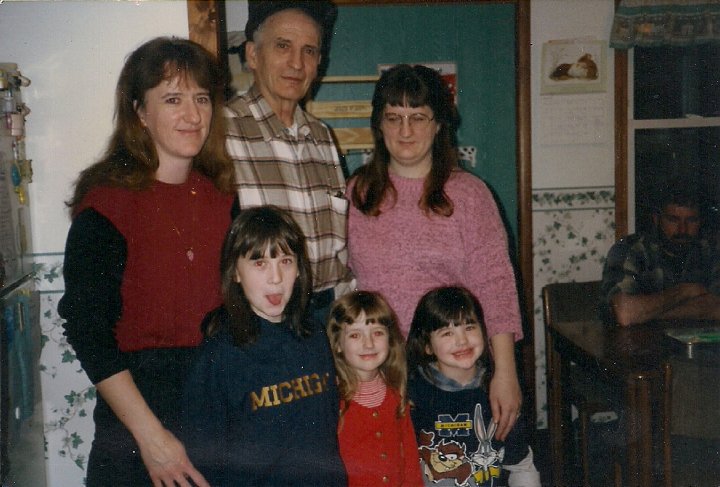
The back row left to right is my mom, Papa and my aunt. The front row left to right is my sister Erica, my cousin and I.
Many mornings, Papa would sit across from me eating breakfast while he had his coffee. He always had a spoon in his cup, that he’d use to stir it. Tink tink, tink tink. I remember at some point later in my childhood noticing that even after he stopped stirring, he would just be holding the spoon but it would tink against the side of his cup because his hand would shake ever so slightly. I don’t remember if I asked or if someone told me, but eventually, I learned it was the result of his Parkinson’s disease. His hands would tremor even when he just trying to hold still.
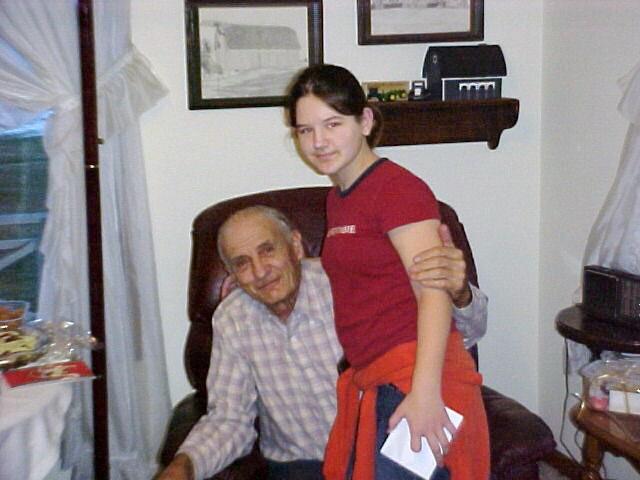
Papa and I when I was perhaps 12 or 13.
He passed away back in December at age 90, unrelated to his Parkinson’s Disease. Last summer prior, while at his house, we found tiny bits of glass – pieces of a coffee cup that had hit the floor and shattered. Clearly, his motor troubles had grown worse over the years. A few years ago he failed to balance his paper plate at a birthday party and it hit the ground. After having health issues, he had an in-home nurse for a while, and they helped my family to make his home a bit safer for him. They did things like remove a loose rug. Many people with Parkinson’s struggle with balance and are prone to tripping or falling, and a loose rug can increase the risk of tripping, slipping and falling. These types of symptoms aren’t surprising to most who know of Parkinson’s disease, because people think of it as causing motor symptoms.
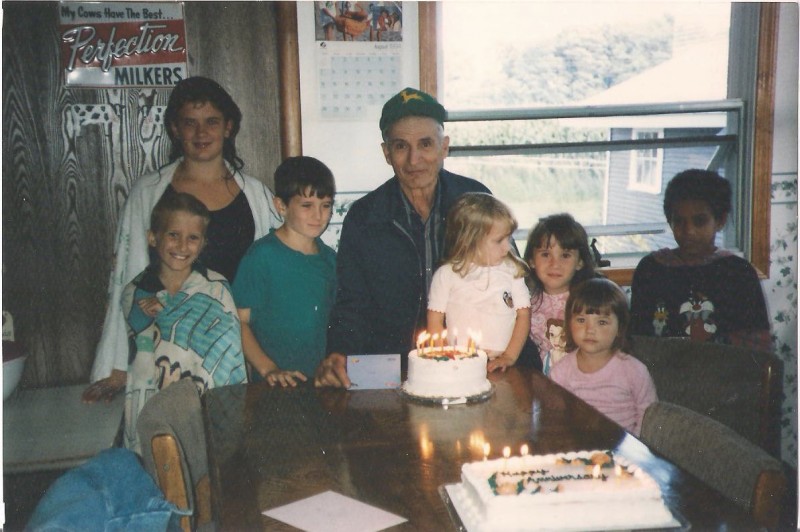
Papa’s birthday one year. I’m the little one sitting in the chair wearing pink.
There is more to Parkinson’s disease than motor issues, though. MoreToParkinsons.com is trying to spread the word that Parkinson’s disease is not simply motor based symptoms. There are non-movement symptoms of Parkinson’s that include delusions and hallucinations. More than half of people with Parkinson’s disease will have hallucinations or delusions over the course of their disease.
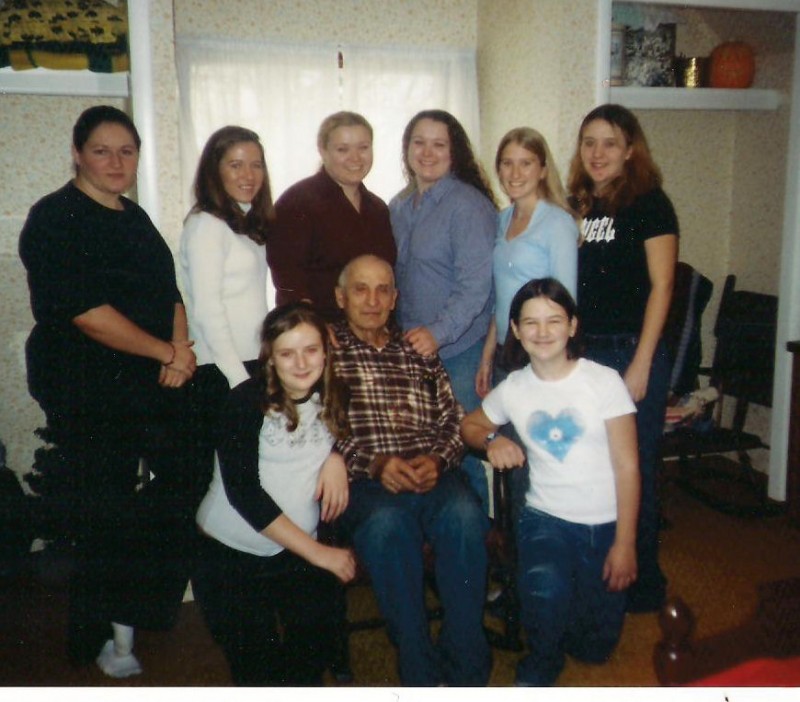
Papa with several of his grandaughters. I’m in the front row with the blue heart on my shirt.
I did not recognize it as an element of his disease, but I now believe that my grandfather struggled with delusions as part of his disease. A few years prior to his passing, he proclaimed that he was allergic to things that he had never been allergic to prior. While allergies can develop at random, nobody in my family had seen any signs of allergic reaction in him. While he was never tested for the allergy, we all were pretty confident that he had somehow convinced himself of something that simply was not true. This wasn’t a big deal because it was okay to simply let him avoid his suspected allergen, it did not impact his day to day life. Still, it just felt very strange that he was so convinced that he had an allergy that the rest of us were pretty certain he did not have.
I had no idea that Parkinson’s Disease could cause delusions or incorrect beliefs, so I never considered that it was related to his disease. As far as I know, my grandfather did not suffer from hallucinations, but many do. Hallucinations are when people see, hear or experience things that aren’t real. People with Parkinson’s frequently report seeing people or animals (often groups of them) that are not truly there. Sometimes the hallucinations become so frequent that the individual can become unable to distinguish between what is real and what is imagined, and they may react to their hallucinations.
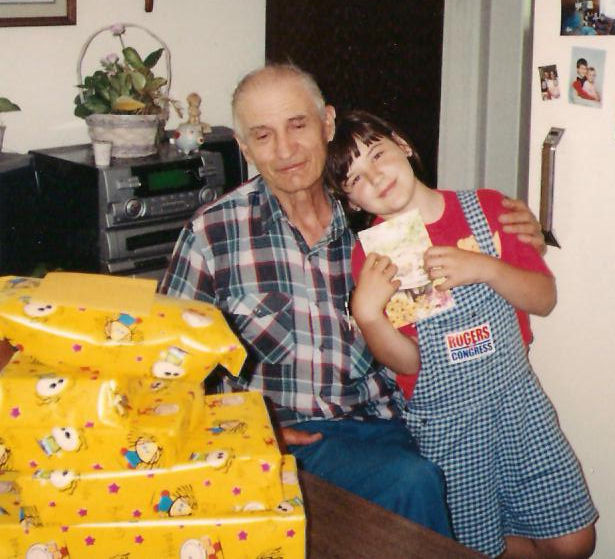
I think this was my 8th birthday party.
Delusions are false beliefs that cannot be supported by evidence. This is likely what my grandfather’s belief about his allergies was. Often times, people with Parkinson’s have delusions that have paranoid themes. For example, the individual may accuse their spouse or someone else close to them of trying to access their life savings. Or, they may accuse a lifelong spouse of committing adultery.
Unfortunately, many people with Parkinson’s disease will fail to tell their health care providers about their delusions or hallucinations. This is suspected to be because people find these symptoms embarrassing, or perhaps because they do not realize they are a common symptom of Parkinson’s, so they do not understand their cause.
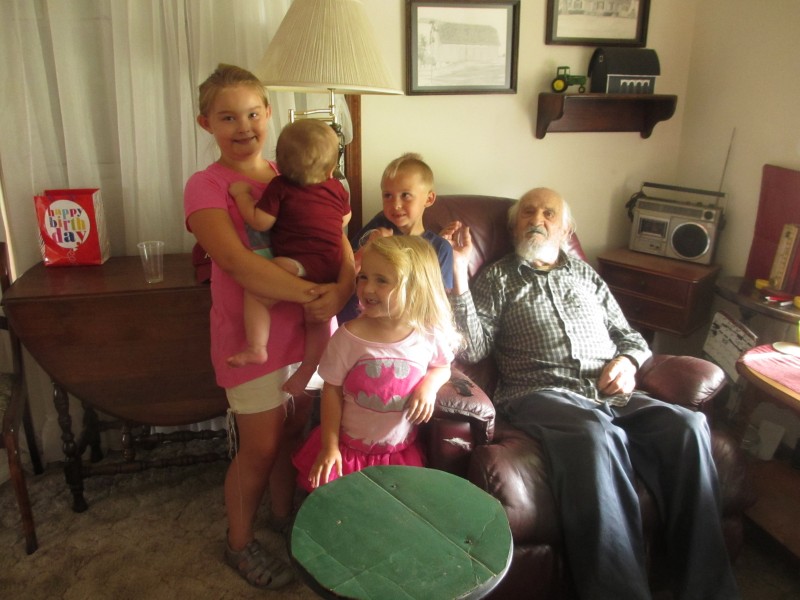
Papa with some of his great-grandkids on his 89th birthday. He quit shaving due to his tremors.
Early signs and symptoms of hallucinations and delusions should not be ignored because they can get worse. If symptoms worsen, the person may lose the ability to determine reality, which can be dangerous. The symptoms can also cause distress to the individual, and to their family and care partners. Recently a survey was done on those with PD who had non-movement symptoms, and 84% agreed that the symptoms had a negative impact on quality of life. The symptoms can potentially impact activities in daily life such as socialization, planning for the future, or being intimate with a spouse.
If you or someone close to you is experiencing the non-movement symptoms of Parkinson’s, it’s important to know you are not alone, and you may be able to get help. Talk to a Parkinson’s specialist to learn more about treatment options, such as an FDA-approved medication that is intended for the treatment of hallucinations and delusions associated with Parkinson’s disease. Learn more about the non-movement symptoms of Parkinson’s at MoreToParkinsons.Com.


Hi there! I am Emily Evert, the owner of Emily Reviews. I am 28 and live in a small town in Michigan with my boyfriend Ryan and our two pugs. I have a large family and I adore my nieces and nephews. I love reading memoirs, and learning about child development and psychology. I love watching The Game of Thrones, Teen Mom, Sister Wives and Veep. I like listening to Jason Isbell, John Prine, and other alt-country or Americana music. I created Emily Reviews as a creative outlet to share my life and the products that I love with others.
This post currently has 5 responses.
-
This is such a horrible disease. It robs people and the ones around them of good memories.
-
Goodness I had type out a ton of stuff, and the page ‘snapped’ :/ I know his disease well, I hope more light is shed on it. And a whole lot more research.
-
It is so sad to watch someone you love go through this terrible disease. I worked in a nursing home where I took care of patients with this disease. I really came to understand this disease pretty well. The one thing I did not know is the hallucinations. The one sign that stands out to me is the pill rolling.
-
Our family has been lucky in the pool of life. Most of my relatives on mom & dad side have lived into mid 80’s or later. But I have several friends that are not so lucky and it is hard to know they worry about their future











I have a friend who has Parkinson’s. It’s been hard watching her go downhill.